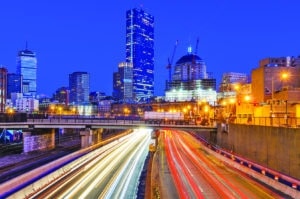
Boston-area drivers spent, on average, 164 hours caught in traffic in 2018 according to traffic data firm INRIX, equivalent to a whole month of workdays.
The vast majority of Massachusetts workers experience some level of frustration and anger with their daily commutes, according to new polling that suggests residents view the state transportation system as one in “urgent” need of improvement.
Nearly one-fourth of Greater Boston residents have considered moving to another state due to frustration with their commute. Voters also generally support state policy makers who want to raise more revenue to address the problem, though it’s unclear who they think should pay.
“There can only be one conclusion from this poll: The patient doesn’t need a Band-Aid; the patient needs surgery,” Jesse Mermell, president of the Alliance for Business Leadership, said in a statement.
“In order to ensure the commonwealth’s future economic competitiveness, solutions to this problem must be comprehensive, equitable, and implemented quickly,” Mermell said.
Sixty-six percent said action is “urgently needed” to improve the state’s transportation system compared to the 21 percent that said they thought the system was working “pretty well.”
Sixty-five percent said doing something to address the high cost of housing should also be a priority for policy makers, ranking it behind education and job creation, but ahead of transportation on their priority list.
The survey done by the MassINC Polling Group reinforces the perceptions of traffic and commuting in Greater Boston that have fueled a years-long debate on Beacon Hill about what to do about the condition of the state’s infrastructure and public transit.
The polling found that 38 percent of voters believe it has gotten harder over the last five years to move around the part of the state where they live, and 80 percent support the general idea of the state raising new money to spend on roads, bridges and public transit.
Users of public transit were more likely than drivers to report becoming stressed or angry by their commutes, being late for work or needing to leave early or later to avoid peak travel times, and to having considered changing jobs or moving because of their commutes.
MassINC did not survey voter opinions on specific tax increases, but did find at least 80 percent support for off-peak toll discounts and increasing the frequency of commuter rail trains running to and from Boston to every 15 to 30 minutes “throughout the day, at night, and on weekends.”
Support was lower, but there was still a solid majority for Gov. Charlie Baker’s pursuit of a regional transportation climate initiative to curb greenhouse gas emissions and raise money for transportation investment (68 percent), as well as the idea of allowing regional ballot questions to raise taxes for specific regional improvement projects (55 percent).
The poll sampled the opinions of 1,200 voters in an online survey from March 15 through March 25. The survey was sponsored by the Barr Foundation and designed with input from a steering committee of policy experts, transportation planners and business leaders, according to MassINC.
Fifty-six percent of those surveyed said their commute to work or school was 30 minutes or less, while 11 percent said they commuted between 45 minutes to an hour each way and 7 percent said they had a commuted longer than an hour one-way.
The survey also found that 67 percent of voters said they had changed their schedules to avoid the worst travel times and 63 percent had become angry or frustrated by delays and traffic, including more than a third that reported being late for medical appointments, daycare pickups or work.
The commute has become especially bad in Greater Boston where 30 percent of full-time employees reported considering looking for a new job, and 23 percent said they’d considered leaving the area.
House Speaker Robert DeLeo has promised to have a debate over new revenues later this year, and has asked the business community to be a part of that dialogue, which recently prompted Greater Boston Chamber of Commerce CEO Jim Rooney and Worcester Chamber of Commerce CEO Tim Murray to form a new coalition.
Democratic leaders also continue to support the idea of imposing a surtax on income above $1 million to generate new revenue for transportation and education. DeLeo and Senate President Karen Spilka are expected to try again to put a question on the statewide ballot in 2022, and there appears to be sufficient support in both branches.






